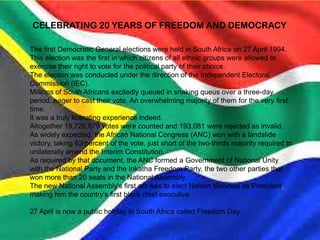CELEBRATING 20 YEARS OF LIBERATION & DEMOCRACY
- 1. CELEBRATING 20 YEARS OF FREEDOM AND DEMOCRACY The first Democratic General elections were held in South Africa on 27 April 1994. This election was the first in which citizens of all ethnic groups were allowed to exercise their right to vote for the political party of their choice. The election was conducted under the direction of the Independent Electoral Commission (IEC). Millions of South Africans excitedly queued in snaking queus over a three-day period, eager to cast their vote. An overwhelming majority of them for the very first time. It was a truly liberating experience indeed. Altogether 19,726,579 votes were counted and 193,081 were rejected as invalid. As widely expected, the African National Congress (ANC) won with a landslide victory, taking 62 percent of the vote, just short of the two-thirds majority required to unilaterally amend the Interim Constitution. As required by that document, the ANC formed a Government of National Unity with the National Party and the Inkatha Freedom Party, the two other parties that won more than 20 seats in the National Assembly. The new National Assembly's first act was to elect Nelson Mandela as President, making him the country's first black chief executive. 27 April is now a public holiday in South Africa called Freedom Day.
- 2. CELEBRATING 20 YEARS OF FREEDOM AND DEMOCRACY
- 3. CELEBRATING 20 YEARS OF FREEDOM AND DEMOCRACY
- 4. CELEBRATING 20 YEARS OF FREEDOM AND DEMOCRACY
- 5. CELEBRATING 20 YEARS OF FREEDOM AND DEMOCRACY
- 6. CELEBRATING 20 YEARS OF FREEDOM AND DEMOCRACY
- 7. CELEBRATING 20 YEARS OF FREEDOM AND DEMOCRACY







